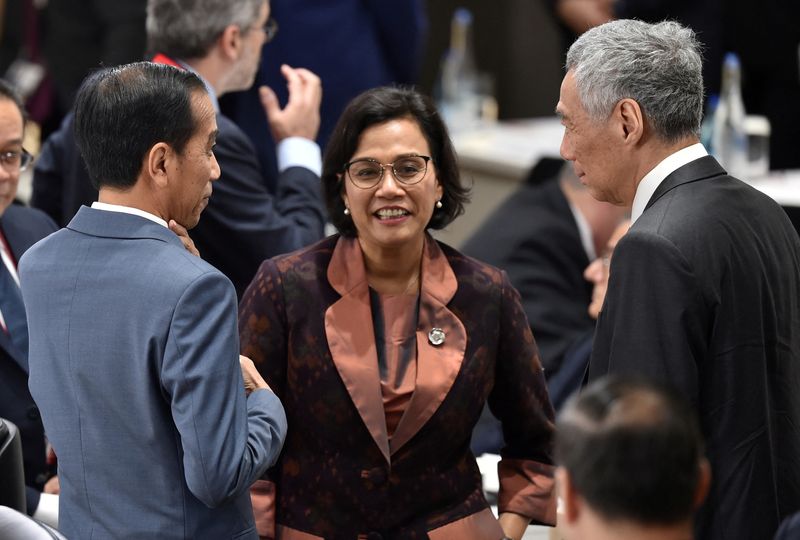By Ankur Banerjee
SINGAPORE (Reuters) - Indonesian markets, after a period of relative calm, are showing signs of concern about the prospect of a drawn out national election and the possibility of the country's highly regarded finance minister, Sri Mulyani Indrawati, departing.
As Indonesia heads to presidential and legislative elections on Feb. 14, Defence Minister Prabowo Subianto leads in opinion polls with President Joko Widodo's son as his running mate.
The president's cabinet - unhappy with last-minute rule changes allowing his son to run with Prabowo - has fractured and several ministers including Sri Mulyani are reported to be considering resigning.
Sri Mulyani has not commented on the reports but her ministry has said she was continuing to carry out her duties and on Tuesday, she held a quarterly news conference. She has posted messages about her finance ministry work to her social media accounts daily.
Nicholas Chia, Asia macro strategist at Standard Chartered (OTC:SCBFF), said the possibility of Sri Mulyani quitting showed that politics and policy are driven by personalities instead of institutions in Indonesia.
"Which is not to say that things will take a turn for the worse, but investors may be on tenterhooks over the lack of clarity on the next administration's policy priorities," he said.
FISCAL FEAR FACTOR
In her two stints as finance minister under two presidents, Sri Mulyani has won plaudits for reforming the taxation system and for her role in steering Southeast Asia's biggest economy through the pandemic.
When the former World Bank managing director resigned in May 2010, Indonesia stocks slid 4% on the day and the currency weakened.
Reports on Sri Mulyani's latest potential exit sent the rupiah tumbling last week, prompting the central bank to intervene in the currency market. The rupiah has slipped 2% so far in 2024, after eking out a small gain last year against the dollar. The stock market is down 1% in the year after rising 6% in 2023.
Foreign money coming into Indonesian assets has slowed as well. International investors have spent $420 million on Indonesian bonds up to Jan. 24 , according to data compiled by HSBC.
That compares to inflows of $2.1 billion in November and December combined, much of that on the back of expectations that the Federal Reserve would start cutting rates early in 2024.
The 10-year bond yield is at 6.59%, coming off the one-year peak above 7% it touched in October.
Daniel Tan, portfolio manager at Singapore-based Grasshopper Asset Management, said uncertainty could dampen foreign investment until the new president's governing coalition is assembled, the cabinet named and budget priorities announced.
The prospect of the election requiring a second round, to be held on June 26, has also left investors nervous.
President Jokowi, as he is popularly known, is not allowed to seek re-election after serving the maximum two five-year term, although expectations are that whoever follows will continue to largely follow policies that have helped the trillion-dollar G20 economy thrive.
Investors' main concerns are around spending and populism, while candidates' differing views over ties with China, military budgets and the country's dependence on the resources sector are also in focus. Prabowo's comments during a Presidential debate about being open to taking Indonesia's debt to GDP to 50% from below 40% currently has also added to anxiety.
Citi analyst Helmi Arman said "assessments of bond supply risk for 2025 and beyond, as well as the trajectory of many economic indicators, could be affected" if investors perceive a change in the fiscal regime.
Foreigners hold roughly a fifth of the high-yielding bond market, which used to be notoriously volatile during Indonesia's previous episodes of skyrocketing inflation.
To be sure, some investors still see Indonesia as an opportunity irrespective of who comes to power. Inflation has been largely controlled, and analysts expect the economy to grow a healthy 5% in 2024, with interest rates likely to be cut in the second half.

Vikas Pershad, portfolio manager for Asian equities at M&G Investments, said there are a lot of opportunities in Indonesian markets, describing it as an under-appreciated large liquid market with rapid growth economic prospects.
"There's a lot of promise that has been made. There's a lot more to be made, and I don't think any new administration is going to change that."